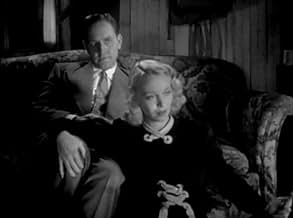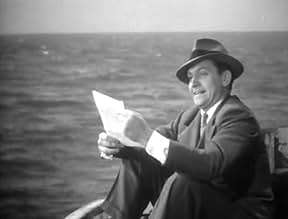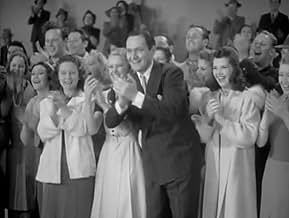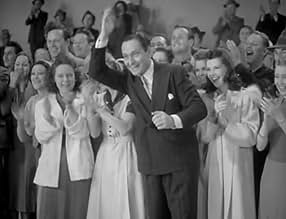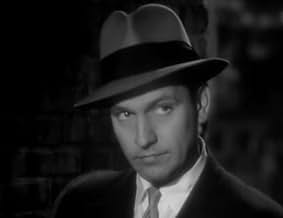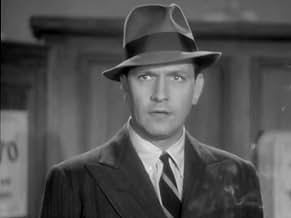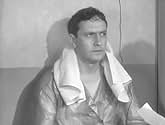Agrega una trama en tu idiomaA young heiress runs away from her overprotective grandfather. Penniless on the streets of New York, she manages to find employment, but a reporter knows her true identity.A young heiress runs away from her overprotective grandfather. Penniless on the streets of New York, she manages to find employment, but a reporter knows her true identity.A young heiress runs away from her overprotective grandfather. Penniless on the streets of New York, she manages to find employment, but a reporter knows her true identity.
- Dirección
- Guionistas
- Elenco
- Nominado a 1 premio Óscar
- 1 nominación en total
Syd Saylor
- Robinson
- (as Sid Saylor)
Ernie Adams
- Cafe Counterman
- (sin créditos)
Ralph Brooks
- Cafe Customer
- (sin créditos)
Horace G. Brown
- Ice Skater
- (sin créditos)
George Burton
- Drayman
- (sin créditos)
- Dirección
- Guionistas
- Todo el elenco y el equipo
- Producción, taquilla y más en IMDbPro
Opiniones destacadas
I think I liked this movie despite the rather formulaic and ridiculous plot because both Viginia Bruce and Frederic March did such a wonderful job with this romantic comedy from Hal Roach Productions.
Virginia is the grand-daughter of a very wealthy but extremely overprotective man. He won't let her go anywhere without him and sees danger around every corner. As a result, she is smothered and bored--aching to live a real life. She escapes and establishes a new identity as a regular working girl. However, reporter Frederic March finds out about the ruse and wants to exploit the woman for a buck. However, once they meet, sparks begin to fly and he is torn between riches and his new love.
You know about where the movie will end--after all, it's a formulaic romantic comedy from an era when the movies never dared stray from the expected course. However, how delicately and believably the stars follow this formula is what makes this film so worth watching. A cute and satisfying little film.
By the way, at the very end there is a cute little cameo by the silent screen star Harry Langdon as the preacher. While his best years in movies were long behind him, he did continue to do small roles in a variety of films over the years.
Virginia is the grand-daughter of a very wealthy but extremely overprotective man. He won't let her go anywhere without him and sees danger around every corner. As a result, she is smothered and bored--aching to live a real life. She escapes and establishes a new identity as a regular working girl. However, reporter Frederic March finds out about the ruse and wants to exploit the woman for a buck. However, once they meet, sparks begin to fly and he is torn between riches and his new love.
You know about where the movie will end--after all, it's a formulaic romantic comedy from an era when the movies never dared stray from the expected course. However, how delicately and believably the stars follow this formula is what makes this film so worth watching. A cute and satisfying little film.
By the way, at the very end there is a cute little cameo by the silent screen star Harry Langdon as the preacher. While his best years in movies were long behind him, he did continue to do small roles in a variety of films over the years.
HEART is an attempt at a screwball comedy that fails for a couple of reasons: a plot that gets too entangled, to the point of incredulity, and a lead actress who may look a little like Carol Lombard, but clearly isn't. Virginia Bruce is the female in question as a runaway heiress who ends up working incognito in her grandfather's department store, clearly meant to resemble Macy's. The thin-faced Bruce is a bit too wistful for the role, unfortunately. The role really could have used Lombard -- or Thelma Todd or Irene Dunne or Katherine Hepburn or Claudette Colbert, or even one of the Bennett sisters. Frederic March is, as always, note-perfect as a cynical reporter on Bruce's trail who -- what else? -- ends up falling for her. There is a stunt-filled ice skating sequence that takes up a bit too much time, compounded by a very rushed ending that leaves major plot strings untied. The wonderful Eugene Palette is on hand as March's blustery editor, and wisecracking Patsy Kelly is in fine form as a downtrodden store clerk who takes Bruce in. This may be no BRINGING UP BABY or NOTHING SACRED or IT HAPPENED ONE NIGHT, but it is fun to watch March, Kelly and Palette in action. And it is also viewable in its historic context, surrounded as it was by several masterpieces of the genre.
Though the gimmick of the runaway heiress was beginning to wear thin by 1938, There Goes My Heart still is entertaining enough with a sparkling cast going through it's usual paces.
Virginia Bruce is our heiress in this one and reprising his role of hard hitting reporter from Nothing Sacred is Fredric March. Two leads of this magnitude is not usual for the Hal Roach studio which normally was doing two and three reel comedies. But even though this is recycled material it still is served up rather nicely. Best scene for March and Bruce is at the skating rink playing musical chairs on roller skates. March is good, but this was the kind of material Cary Grant would have relished.
Hal Roach did give his director Norman McLeod a fabulous supporting cast to work with all going through their various screen images that we love. Best in the group is Patsy Kelly playing the shop-girl who happens to work in Bruce's grandfather's department store and who takes in Bruce not knowing who she is and gets her job at the store. Nancy Carroll the former silent screen star is a jealous co-worker and Irving Bacon is the sexually harassing supervisor.
Others in this incredibly good cast are Claude Gillingwater as Bruce's tycoon grandfather, Eugene Palette as March's editor, Arthur Lake as March's friend and newspaper photographer and Alan Mowbray as Kelly's boyfriend studying to be a chiropractor. Yes, Alan Mowbray and Patsy Kelly as a couple. Until i saw this film I never would have believed them as a screen team. Patsy's best moments are demonstrating an exercise machine at the store. You should also see newly hired sales person Virginia Bruce waiting on Marjorie Main.
At the very end of the film, former silent screen comic star Harry Langdon plays a minister. At this point in his career, Langdon was accepting any kind of work and part he could get. Nothing especially hilarious about his performance, it's too brief and he's surrounded by too many other high caliber performers in this cast to shine in any way.
It's not one of Fredric March's best films, but it's still amusing enough and the ensemble can't be beat.
Virginia Bruce is our heiress in this one and reprising his role of hard hitting reporter from Nothing Sacred is Fredric March. Two leads of this magnitude is not usual for the Hal Roach studio which normally was doing two and three reel comedies. But even though this is recycled material it still is served up rather nicely. Best scene for March and Bruce is at the skating rink playing musical chairs on roller skates. March is good, but this was the kind of material Cary Grant would have relished.
Hal Roach did give his director Norman McLeod a fabulous supporting cast to work with all going through their various screen images that we love. Best in the group is Patsy Kelly playing the shop-girl who happens to work in Bruce's grandfather's department store and who takes in Bruce not knowing who she is and gets her job at the store. Nancy Carroll the former silent screen star is a jealous co-worker and Irving Bacon is the sexually harassing supervisor.
Others in this incredibly good cast are Claude Gillingwater as Bruce's tycoon grandfather, Eugene Palette as March's editor, Arthur Lake as March's friend and newspaper photographer and Alan Mowbray as Kelly's boyfriend studying to be a chiropractor. Yes, Alan Mowbray and Patsy Kelly as a couple. Until i saw this film I never would have believed them as a screen team. Patsy's best moments are demonstrating an exercise machine at the store. You should also see newly hired sales person Virginia Bruce waiting on Marjorie Main.
At the very end of the film, former silent screen comic star Harry Langdon plays a minister. At this point in his career, Langdon was accepting any kind of work and part he could get. Nothing especially hilarious about his performance, it's too brief and he's surrounded by too many other high caliber performers in this cast to shine in any way.
It's not one of Fredric March's best films, but it's still amusing enough and the ensemble can't be beat.
Okay, so this is a copy of It Happened One Night. Big deal. There's actually a fair amount in it that is different. The basic elements are the same: Girl runs away from dad/grandfather and dodges the detectives but comes face-to-face with a reporter hiding his identity from her.
I would say that the primary difference between films is the attitudes of the leading men. Clark is essentially blackmailing Claudette in IHON, while in this film, Fredric doesn't seem to have any intention of publicising Virginia - he doesn't want to write the story in the first place, keeps delaying the finish of his story, and finally he rips it up and refuses to do it at all. In TGMH, there is also a strange but amusing supporting actress who works in the same store as Virginia does. Oscar Shapely of IHON is not her equivalent, though amusing in his own way, believe you me.
It Happened One Night is definitely the more solid of the two movies, but There Goes My Heart is fun to watch and should be more actively viewed than it is, instead of being condemned by a majority that probably hasn't seen it, but bases their opinions on the negative reviews of others. I myself was sceptical - I just watched it prepared to react whatever way the movie led me, and I have to say that I did like it and would definitely see it again.
I would say that the primary difference between films is the attitudes of the leading men. Clark is essentially blackmailing Claudette in IHON, while in this film, Fredric doesn't seem to have any intention of publicising Virginia - he doesn't want to write the story in the first place, keeps delaying the finish of his story, and finally he rips it up and refuses to do it at all. In TGMH, there is also a strange but amusing supporting actress who works in the same store as Virginia does. Oscar Shapely of IHON is not her equivalent, though amusing in his own way, believe you me.
It Happened One Night is definitely the more solid of the two movies, but There Goes My Heart is fun to watch and should be more actively viewed than it is, instead of being condemned by a majority that probably hasn't seen it, but bases their opinions on the negative reviews of others. I myself was sceptical - I just watched it prepared to react whatever way the movie led me, and I have to say that I did like it and would definitely see it again.
...It doesn't entirely work, unfortunately. Fredric March is excellent, as always. What a fine and versatile actor! And Virginia Bruce is winning, as she always was. She plays an heiress, he a newspaper reporter sent to get a story about her. (This aspect presages the Bette Davis movie "Golden Arrows.") Eugene Palette, always a treat, plays his editor.
Bruce is not an ideal screwball heroine, unfortunately. Her pale, wistful beauty doesn't really lend itself to the genre, though she is dine in the movie. Patsy Kelly is hilarious as her pal: Bruce has sailed to Manhattan in her yacht while granddaddy is away. She finds herself in the City with no money. At a diner (kind of an Automat but not really) she and Kelly scam some food. Kelly picks her up! "If you don't have anywhere else to go, you can spend the night at my place." Kelly's ostensible romantic interest is Alan Mowbry, a neighbor who is studying to become a chiropractor by mail. What a couple they make! Back at the store where Kelly works, which Grandpa owns, we see Kelly demonstrating a device called "Vibrato." It's a kind of Sapphic intimation of the Vega-Meta-Vitamin sequence decades later from "I Love Lucy." The movie has a sterling supporting cast, which also includes Nancy Carroll, delicious as a jealous, catty fellow saleswoman.
It also, unfortunately, has afar too lengthy and pointless scene with Bruce and march at a skating rink. Why it was allowed to go on so long is a mystery. (There is a similar scene in one of Irene Dunne's lesser comedies -- "Joy of Living," I think.) The movie begins in a stylish, chic manner but it loses its way. It could have been in the top tier but as it is it's still fun.
Bruce is not an ideal screwball heroine, unfortunately. Her pale, wistful beauty doesn't really lend itself to the genre, though she is dine in the movie. Patsy Kelly is hilarious as her pal: Bruce has sailed to Manhattan in her yacht while granddaddy is away. She finds herself in the City with no money. At a diner (kind of an Automat but not really) she and Kelly scam some food. Kelly picks her up! "If you don't have anywhere else to go, you can spend the night at my place." Kelly's ostensible romantic interest is Alan Mowbry, a neighbor who is studying to become a chiropractor by mail. What a couple they make! Back at the store where Kelly works, which Grandpa owns, we see Kelly demonstrating a device called "Vibrato." It's a kind of Sapphic intimation of the Vega-Meta-Vitamin sequence decades later from "I Love Lucy." The movie has a sterling supporting cast, which also includes Nancy Carroll, delicious as a jealous, catty fellow saleswoman.
It also, unfortunately, has afar too lengthy and pointless scene with Bruce and march at a skating rink. Why it was allowed to go on so long is a mystery. (There is a similar scene in one of Irene Dunne's lesser comedies -- "Joy of Living," I think.) The movie begins in a stylish, chic manner but it loses its way. It could have been in the top tier but as it is it's still fun.
¿Sabías que…?
- TriviaAccording to a New York Times article on 16 October 1938, the Citizen's Chiropractic Committee of New York State sued the film producers, authors and Alan Mowbray for $100,000 claiming damages to the profession. One doctor was very upset that the film implied it was possible to go through a chiropractic school through a correspondence course. The outcome of the suit is not known.
- Citas
Peggy O'Brien: Just think, someday i'll be Mrs. Doctor Pennypepper E. Pennypepper... then I'll find out what the E. stands for!
- Créditos curiososThe opening credits are shown as if viewed through a ship's porthole with waves erasing each set of credits.
- Bandas sonorasA Life on the Ocean Wave
(1838) (uncredited)
Music by Henry Russell
Lyrics by Epes Sargent
Sung a cappella by Fredric March
Selecciones populares
Inicia sesión para calificar y agrega a la lista de videos para obtener recomendaciones personalizadas
Detalles
- Fecha de lanzamiento
- País de origen
- Idioma
- También se conoce como
- En flicka överbord
- Locaciones de filmación
- Productora
- Ver más créditos de la compañía en IMDbPro
- Tiempo de ejecución
- 1h 23min(83 min)
- Color
- Relación de aspecto
- 1.37 : 1
Contribuir a esta página
Sugiere una edición o agrega el contenido que falta

